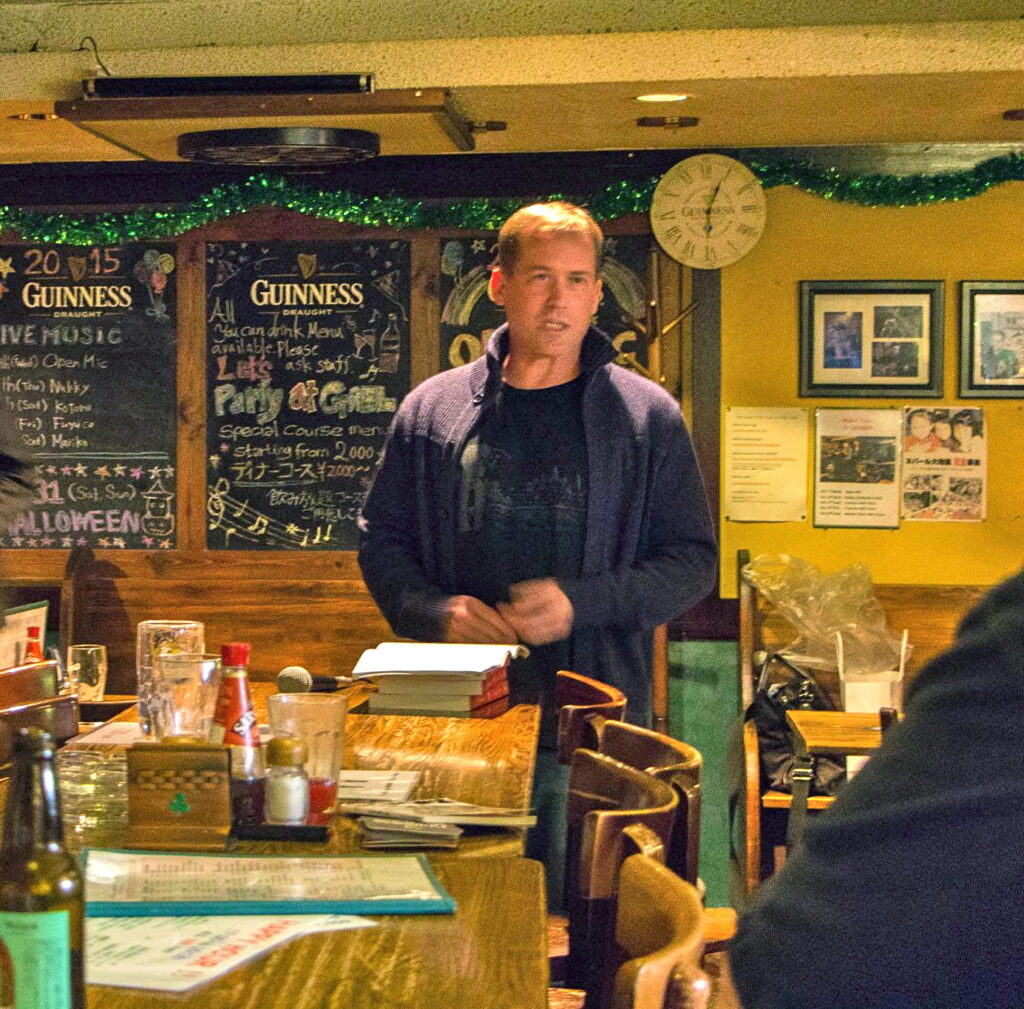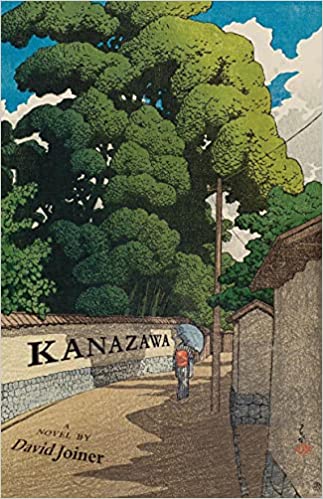This interview celebrates David Joiner’s new novel Kanazawa, published by Stone Bridge Press.
1) Why Kanazawa?
Kanazawa has a rich literary history, and as a resident there I encountered it often while exploring the city. It boasts museums not only to several of its most famous writers, but also to the city’s literary history; a literary hall where events are sometimes held; temples that commemorate famous Kanazawa writers and poets; streets and parks named after Kanazawa writers; statues erected to these writers and even to some of their more famous characters. I’ve even seen sweets named after Izumi Kyoka, Kanazawa’s most famous writer. Some local ryokan also proudly display photos and writing implements of Kanazawa writers who stayed there. I was aware of many of these things before my wife and I moved to Kanazawa, but once we became residents of the city this respect for literature really seeped into my consciousness. And I soon decided I’d try to write something that might bring me closer to the city’s literary history and contribute what little I could to the cultural life of where we lived. I also thought it worthwhile to try to write and get published the first literary novel in English to be set in Kanazawa. Because it had never been done, I was lucky to have had the chance to write about whatever I pleased without worrying over what anyone else had done before.
2) This is your second published novel. How does it compare with the first?
It’s a little hard to compare them since my first novel, Lotusland, was set in Vietnam and made use of the decade I lived there. I suppose there are similarities, though. Particularly in telling a story in third person from the point of view of an American man deeply immersed in, and appreciative of, the foreign culture where he lives. And also being romantically involved with a local woman who helps him delve more deeply into her culture. Both novels focus on bringing aspects of those cultures onto the page. In Lotusland, I explored Vietnamese lacquer painting to a great extent. In Kanazawa, the cultural focus falls on, among other things, Japanese literature, specifically the life and work of Izumi Kyoka. I also devote space in the novel to the sculptures that grace the city, and my characters also create ikebana and draw and paint. Lotusland also focuses on the lingering effects of wartime Agent Orange use on the Vietnamese population, but Kanazawa shines no equivalent spotlight on such important societal issues.
3) How has the reception been so far?
Thankfully, no reviews I’ve read (yet) have indicated that readers detest it, and no readers have cursed me that I know of. Some readers have complained that it’s too slow for their tastes, whereas others have expressed an appreciation for how I’ve allowed the story to deliberately and quietly unfold. The Japan Times, Books on Asia, The Foreword Review, and Asia Media International have all recently reviewed Kanazawa. I’m happy to say that all of those reviews have been positive. People seem to appreciate that my novel is set outside Tokyo and Kyoto, settings which tend to dominate books on Japan written by foreigners.

4) You gave a talk to WiK about marketing an earlier book. Is that something you thought of doing for this book?
I think it’s unavoidable if one wants to be read. My publisher, Stone Bridge Press, has its own publicist, and he’s done an incredible job of reaching out to people in the publishing world and literary sphere to try to promote the novel. Small presses, however, have a difficult time attracting the attention given as a matter of course to books – sometimes very bad ones – published by the Big 5 publishers. In any case, my publisher has done a lot in terms of marketing, and though I’ve done my part as well, it’s been difficult for me, on my own, to bring much attention to Kanazawa. But I view this sort of marketing as a long-term commitment, so I’m not done yet trying to increase the novel’s readership over time.
5) What is the most difficult part of being a novelist, would you say?
In terms of writing, just finding the time and space to immerse myself in my work. I have a lot going on now that’s become a distraction, things that I’m not used to dealing with. But in and of itself, writing a novel isn’t particularly difficult. (And if I can do it, anyone can.) Probably the most difficult part is finding readers. If you spend years writing a book, what’s the point of it all if no one ever reads it? That can be a difficult hurdle to overcome. Without big money to advertise my novel, many readers will never know that Kanazawa even exists. It can also be hard to find readers who are open to stories set in foreign cultures, and readers open to someone such as myself who chooses to set his stories in them.
6) What advice would you have for budding novelists in WiK?
Persist. Persist in whatever you’ve decided to write and persist also in trying to find the right publisher, if you want a traditional publisher. And by “right,” I mean a publishing team that really appreciates what you’ve created, what it’s taken you to create it, and who shares the same vision for putting it out into the world.
7) What next?
Two or three things. I’ve finished and have out on submission a second “Ishikawa novel” called The Heron Catchers. It’s quite a bit darker than Kanazawa and is set both in Kanazawa and Yamanaka Onsen (where my wife and I have a home). I’m also still working on a novel I’ve been writing off and on for 20 years, which is set in Vietnam and Cambodia in the early 1990s. And I’d like to write another “Ishikawa novel” soon. I’ve started a third one but have set it aside until I can devote more time and energy to it.
********************
Read David Joiner on Izumi Kyoka here. For the opening chapter of The Heron Catchers, click here. For a 14 minute video feature about his Vietnam novel, Lotusland, see here. For more about David and his writing, please see his author website.

